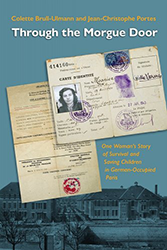Many books have been written about the global and national uptick in antisemitism. Though most are helpful in contextualizing the problem and explaining how we got to where we are, few are as practical as Jonathan Greenblatt’s newest work, It Could Happen Here. Greenblatt spends the first half of the book diagnosing the problem, explaining the different causes and symptoms of antisemitism, both on the political left and right. However, the biggest contribution of the book appears in the second half, when Greenblatt uses his unique experience working on the front lines against hate to explain the many ways we can combat antisemitism today.
Jonathan Greenblatt is the CEO of the Anti-Defamation League (ADL), one of oldest and most effective voices in this country against antisemitism and hatred writ large. Though he has been an ardent advocate and public voice for a while, It Could Happen Here is actually his first book. Because of this, Greenblatt is able to call on all of his personal experiences to make his points. When he speaks about the effects of hatred, he tells the story of standing beside the survivors of the Pittsburgh shooting. When he talks about the need to speak out against tech companies like Facebook that give an online platform to hate speech, he tells the story of his advocacy against them and its successes and challenges.
Greenblatt has written this book for the layperson. He speaks passionately and honestly, but also clearly and straightforwardly, about the problems around him, free of jargon and insider language. He also is a consummate teacher; he carefully constructs acronyms and mnemonics to remember the steps one needs to take when faced with hate speech.
Though many of the ideas in the book are Greenblatt’s, he is able to also call on the many tools developed through the ADL to make his point. Greenblatt is also a master storyteller. His role at the ADL has brought him in contact with a diverse cast of people, from former white supremacists to preteens who face casual antisemitism on the schoolbus. Their stories punctuate and animate his otherwise theoretical work, giving it a human element. Through them, he uses narrative to bolster his careful and well-argued logic.
This is a book for everyone. Although Greenblatt is an expert on antisemitism and spends most of the first half of the book on it, he also knows that hatred cannot be stopped in a vacuum. Greenblatt gives air time to racism, anti-AAPI sentiment, and anti-immigrant bias. Greenblatt understands that any hatred perpetuates all hatred, and thus he gives his readers tools to stop it wherever it lies, even if it is not directly targeted against the Jewish community.
It Could Happen Here is a worthy addition to the canon of books on antisemitism. Whether you want to understand the problem or are actively engaged in ending it and want concrete steps to use in your struggle, this book will aid you along your journey.
Rabbi Marc Katz is the Rabbi at Temple Ner Tamid in Bloomfield, NJ. He is author of the books Yochanan’s Gamble: Judaism’s Pragmatic Approach to Life (JPS) chosen as a finalist for the PROSE award and The Heart of Loneliness: How Jewish Wisdom Can Help You Cope and Find Comfort (Turner Publishing) which was chosen as a finalist for the National Jewish Book Award.



